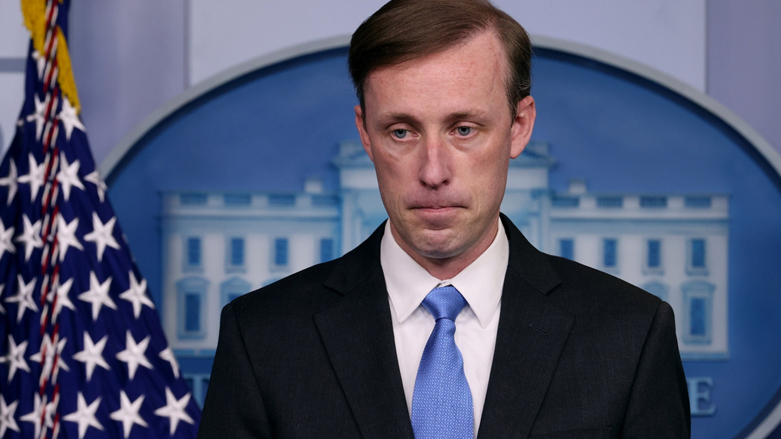US condemns Iran’s repression of protests; hails EU sanctions, which include senior figures in Kurdistan province
Those sanctioned include senior figures involved in the repression of protests in Iran’s province of Kurdistan, as well as four individuals directly responsible for Amini’s death.

WASHINGTON DC, United States (Kurdistan24) The White House expressed its strong disapproval of the Iranian regime’s crackdown on the nation wide protests, triggered by the Sept. 16 death of the young Kurdish woman, Jinna (Mahsa) Amini, while under arrest by Tehran’s so-called morality police for not wearing a headscarf properly.
At the same time, the White House also voiced its support for the new, wide-ranging sanctions announced on Monday by the European Union (EU) and Britain on Iran for its harsh repression of those protests.
Those sanctioned include senior figures involved in the repression of protests in Iran’s province of Kurdistan, as well as four individuals directly responsible for Amini’s death.
Notable is the extent to which the US and EU positions have changed from what they were just two months ago, when the western preoccupation, particularly of the EU and its foreign policy chief, Josep Borrell, was reviving the 2015 Iranian nuclear accord, formally known as the Joint Comprehensive Plan of Action (JCPOA.)
Read More: US affirms ‘gaps remain’ for reviving Iran nuclear accord
The JCPOA is, now, no longer a particular focus. Three factors are behind the change: 1) the continuing protests triggered by Amini’s death, to which the regime has responded harshly, but which are, nonetheless, entering their third month; 2) Iran’s alignment with Russia in its war in Ukraine, above all through the supply of highly effective combat drones; and 3) the fact that after one-and-a-half years of negotiations over renewing the JCPOA, there is still no agreement.
White House Condemns Protests
“We are deeply concerned about reports from Iran of mass arrests, sham trials, and now a death sentence for protesters voicing legitimate demands against a government that systematically denies basic dignity and freedom to its people,” National Security Advisor Jake Sullivan said in a written statement.”
“The eyes of the world are on Iran,” Sullivan continued. “The human rights abuses inflicted by its government must not go without consequence.”
“The United States, standing with our partners and allies around the world,” he affirmed, “will continue to pursue accountability for these abuses through sanctions and other means.”
Sullivan then hailed the new sanctions adopted by the EU and Britain on Monday “against 29 Iranian individuals and three entities involved in the violent crackdown on protestors.”
“The United States stands staunchly with the Iranian people and their demands,” Sullivan concluded.
New EU Sanctions—including heads of institutions of repression in Kurdistan Province
Meeting in Brussels on Monday, the EU sanctioned senior Iranian officials involved in the repression of the ongoing protests. They include such figures as the Interior Minister, Ahmad Vahidi.
Vahidi was appointed to his current position in August 2021, and “since he took office, an unprecedented number of military and security officials have been appointed to provincial governorships who play key roles in coordinating crowd-control activities by police special forces, the Basij militia and the Islamic Revolutionary Guard Corps (IRGC),” the EU said, in announcing the sanctions.
The high-ranking figures whom the EU sanctioned also include the Commander of the Army’s Ground Forces, Brig. Gen. Kiyumars Heidari, who reports directly to the Supreme Leader, Ayatollah Ali Khamenei.
The sanctions also target lesser figures, including those responsible for the repression in Iran’s province of Kurdistan. That includes the head of the IRGC in the province, Gen. Seyed Sadegh Hossein.
“Kurdistan province has seen severe violence by Iranian security forces, including the IRGC, against the 2022 protest wave,” the EU stated.
“Moreover, the IRGC uses Kurdistan province as a base to conduct military operations against Iraqi Kurdistan, which led to the death of more than a dozen non-combatants,” it continued.
Also included in the sanctions is Col. Sereng Hossein Rajabpour, commander of the Beit al-Maqdis (House of Holiness) force, part of the IRGC, in the city of Sanandaj, capital of the province of Kurdistan.
Col. Morteza Mir Aghaei, head of the Basij in Sanandaj, was also sanctioned, as was Ali Reza Moradi, head of the Law Enforcement Forces in Sanandaj.
“Moradi has been responsible for the mass arrest of protesters and ordered the use of lethal weapons against unarmed protesters during the November 2019 nationwide protests in Sanandaj, which resulted in the death of at least two protesters,” the EU stated.
“Blatant and severe human rights violations by the police forces in Sanandaj,” like “indiscriminate shooting with live ammunition at peaceful protesters – including children,” have occurred regularly since mid-September, when the protests against Amini’s death began, as the EU explained.
In addition, to those senior, provincial figures, the four members of Tehran’s so-called morality police, who were directly responsible for Amini’s death, were also sanctioned.
They include two men and two women. The two men are Capt. Enayatollah Rafiei, commander of the squad that detained Amini, and Sgt. Ali Khoshnamvand. The two women are Fatemeh Ghorban-Hosseini and Parastou Safari.
“On 13 September 2022, Rafiei and three other members of his squad arbitrarily arrested 22-year old Mahsa Amini in Tehran, allegedly for wearing a hijab improperly,” the EU stated.
“She was subsequently taken to the Morality Police’s headquarters for an ‘educational and orientation class,’” but “she was brutally beaten and mistreated,” leading to her hospitalization and then “her death on 16 September.”
“The Morality Police’s abusive behavior is not confined to this incident, the EU affirmed, and it “has been widely documented.”